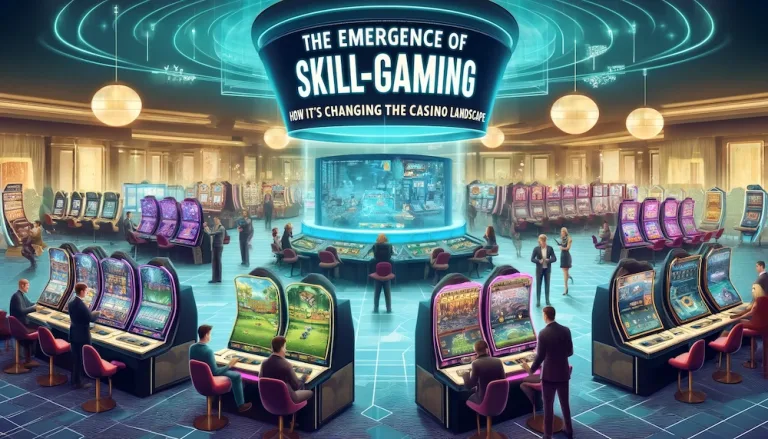Skill-based gaming is emerging as a significant trend in the casino industry, reshaping traditional gaming experiences and attracting a new generation of players. Unlike traditional casino games, which rely primarily on chance, skill-based games incorporate elements that allow players to influence the outcome through their abilities. This article explores the impact of skill-based gaming on the casino landscape, highlighting its benefits, challenges, and future potential.
The Concept of Skill-Based Gaming
Combining Skill and Chance
Skill-based gaming blends elements of skill and chance, allowing players to use their abilities to impact game outcomes. Games such as poker, blackjack, and certain video games require strategic thinking, quick reflexes, and decision-making skills. This combination makes skill-based games more interactive and engaging compared to purely chance-based games like slots.
Attracting a New Generation
Skill-based gaming appeals to younger audiences, particularly millennials and Gen Z players, who are looking for more engaging and interactive experiences. Traditional casino games often fail to captivate these tech-savvy players, who are accustomed to the interactivity and challenge of video games. By offering skill-based games, casinos can attract a broader and younger demographic.
Benefits of Skill-Based Gaming
Enhanced Player Engagement
Skill-based games are inherently more engaging because they require active participation and strategic thinking. Players are motivated to improve their skills, compete with others, and achieve higher levels of success. This increased engagement can lead to longer play sessions and greater player satisfaction.
Increased Player Retention
Skill-based gaming fosters a sense of accomplishment and mastery, which can enhance player retention. As players improve their skills and achieve better outcomes, they are more likely to return to the casino to continue playing. This sense of progression keeps players invested in the gaming experience.
Opportunities for Social Interaction
Many skill-based games, such as poker and certain video games, offer opportunities for social interaction. Players can compete against each other, form teams, and engage in multiplayer experiences. This social aspect enhances the overall gaming experience and fosters a sense of community among players.
Challenges of Implementing Skill-Based Gaming
Balancing Skill and Chance
One of the main challenges of implementing skill-based gaming is finding the right balance between skill and chance. Casinos must ensure that games are fair and that both skillful and casual players have a chance to win. Achieving this balance requires careful game design and testing.
Regulatory Compliance
Skill-based gaming must comply with existing gambling regulations, which vary by jurisdiction. Regulators may have specific requirements for games that incorporate skill elements, including fairness, transparency, and responsible gaming measures. Casinos must navigate these regulations to ensure compliance and avoid legal issues.
Educating Players
Skill-based games may be unfamiliar to traditional casino players, who are more accustomed to chance-based games. Casinos must invest in educating players about how skill-based games work, including the rules, strategies, and potential rewards. Providing tutorials, guides, and demonstrations can help players understand and embrace these new games.
Future Prospects of Skill-Based Gaming
Technological Advancements
The future of skill-based gaming will be driven by technological advancements, including artificial intelligence (AI), virtual reality (VR), and augmented reality (AR). AI can enhance game design and provide personalized experiences, while VR and AR can create immersive and interactive gaming environments. These technologies will further elevate the appeal of skill-based games.
Integration with Esports
Skill-based gaming and esports share many similarities, including a focus on competition, strategy, and skill. The integration of skill-based gaming with esports can create exciting new opportunities for casinos. Hosting esports tournaments, offering betting on esports events, and incorporating esports-inspired games can attract a large and dedicated audience.
Expansion of Game Offerings
As the popularity of skill-based gaming grows, casinos will expand their game offerings to include a wider variety of skill-based games. This expansion will cater to different player preferences and skill levels, providing more options and enhancing the overall gaming experience. Casinos may also collaborate with game developers to create innovative and unique skill-based games.
Conclusion
Skill-based gaming is transforming the casino landscape by offering interactive and engaging gaming experiences that attract a new generation of players. While there are challenges to address, the benefits of skill-based gaming in enhancing player engagement, retention, and social interaction are significant. As technology continues to advance and the demand for interactive experiences grows, the future of skill-based gaming looks promising, with exciting developments that will further reshape the casino industry. Whether you’re a player seeking a more engaging gaming experience or a casino operator looking to innovate, skill-based gaming offers a dynamic and rapidly evolving market to explore.



